#anti dühring
Text
modern insanlık tarihi ne kadar ilerlemiş olursa olsun, o hala felsefenin özel alanı ve ayrıcalığı olan "değer" sorunuyla ilgilenmiyordu.
frederick beiser - hegel'den sonra
#kitap#edebiyat#blogger#felsefe#kitaplar#blog#kitap kurdu#friedrich nietzsche#karl marks#karl marx#das kapital#alman ideolojisi#anti dühring#felsefe blog#martin heidegger#jean paul sartre#arthur schopenhauer#ulus baker#1844 felsefe elyazmaları#michel foucault#spinoza#baruch spinoza#ethika#voltaire#jean jacques rousseau#toplum sözleşmesi#jean baudrillard#ecce homo#umberto eco#alain de botton
13 notes
·
View notes
Text
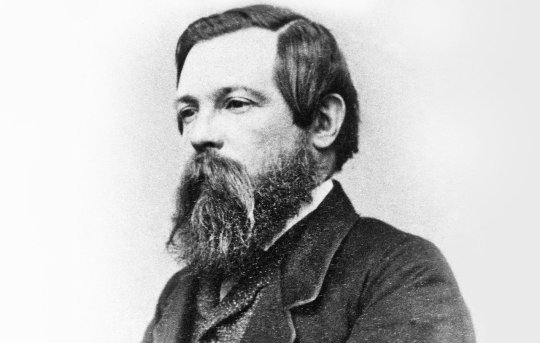
«La libertad no consiste en una soñada independencia respecto de las leyes naturales, sino en el reconocimiento de esas leyes y en la posibilidad, así dada, de hacerlas obrar según un plan para determinados fines. Esto vale tanto respecto de las leyes de la naturaleza externa cuanto respecto de aquellas que regulan el ser somático y espiritual del hombre mismo: dos clases de leyes que podemos separar a lo sumo en la representación, no en la realidad. La libertad de la voluntad no significa, pues, más que la capacidad de poder decidir con conocimiento de causa. Cuanto más libre es el juicio de un ser humano respecto de un determinado punto problemático, con tanta mayor necesidad estará determinado el contenido de ese juicio; mientras que la inseguridad debida a la ignorancia y que elige con aparente arbitrio entre posibilidades de decisión diversas y contradictorias prueba con ello su propia libertad, su situación de dominada por el objeto al que precisamente tendría que dominar. La libertad consiste, pues, en el dominio sobre nosotros mismos y sobre la naturaleza exterior, basado en el conocimiento de las necesidades naturales; por eso es necesariamente un producto de la evolución histórica».
Federico Engels: Anti-Dühring. Editorial Grijalbo, pág. 104. México, 1968.
TGO
@bocadosdefilosofia
@dies-irae-1
#federico engels#friedrich engels#engels#anti-dühring#dühring#libertad#necesidad#materialismo#materialismo dialéctico#necesidades#necesidades naturales#conocimiento#evolución#evolución histórica#naturaleza#naturaleza exterior#leyes naturales#marxismo#teo gómez otero
3 notes
·
View notes
Text
Marx and Engels saw socialism as expanding the forces of production in a quantitative as well as a qualitative sense, and Engels even referred in Anti-Dühring to how the advent of socialism would bring about “the constantly accelerated development of the productive forces and…a practically unlimited increase of production itself.” However, the context in which they were writing was not today’s “full-world economy,” but rather a still early stage of industrialization. In the period of industrial development, extending from the beginning of the eighteenth century until the first Earth Day in 1970, world industrial productive potential increased in size around 1,730 times, which from a nineteenth-century perspective, would have seemed “a practically unlimited increase.” Today it, however, it raises the issue of ecological “overshoot.”
by John Bellamy Foster, Planned Degrowth: Ecosocialism and Sustainable Human Development—An Introduction
28 notes
·
View notes
Text
“Actually, each mental image of the world system is and remains limited, objectively by the historical situation and subjectively by its author's physical and mental constitution.”
― Friedrich Engels, Anti-Dühring: Herr Eugen Dühring's Revolution in Science
10 notes
·
View notes
Photo
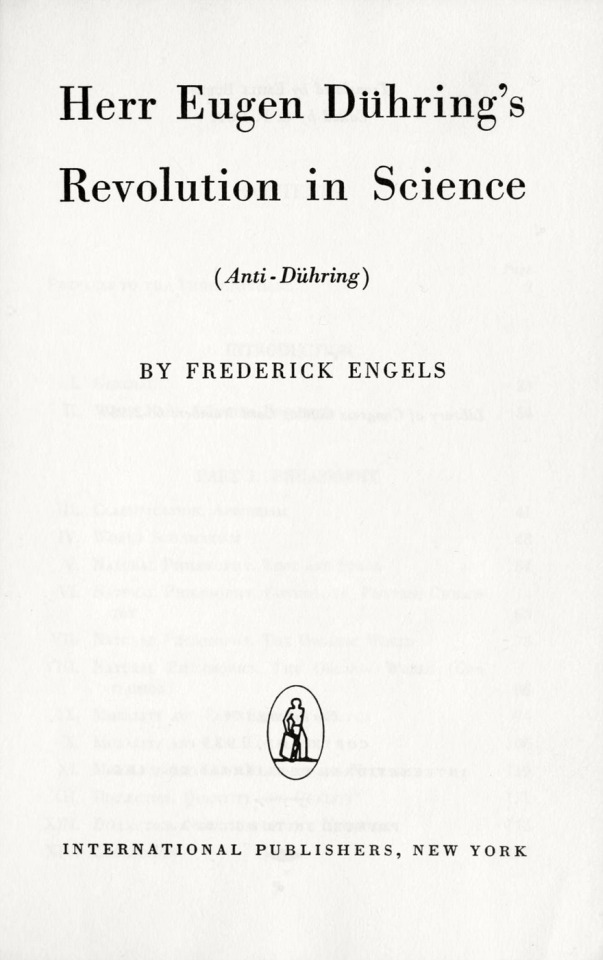

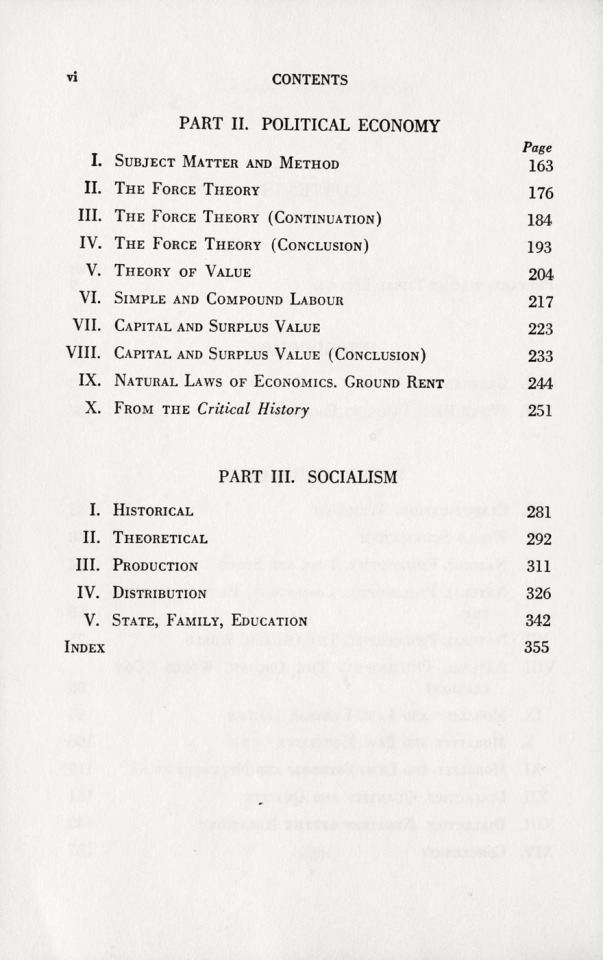
Friedrich Engels, November 28, 1820 / 2022
(images: Friedrich Engels, (1878), Herr Eugen Dühring's Revolution in Science (Anti-Dühring), Translated by Emile Burns, Edited by C. P. Dutt, International Publishers, New York, NY. 1970. Plus Friedrich Engels, (1878), Antidühring, Foreword by Fabio Minazzi, Edizioni Pgreco, Milano, 2021)
#graphic design#philosophy#book#friedrich engels#birthday anniversary#emile burns#clemens palme dutt#fabio minazzi#international publishers#edizioni pgreco#1820s#1870s#1970s#2020s
19 notes
·
View notes
Text
Actually if you read Engels's "Anti-Dühring" you'd know that the limits imposed on authors by the contradictions in the Author-Editor relationship can only be transcended by doing precisely the opposite of everything your editor says and then, subsequently, firing them. This is the cornerstone of any good Marxist philosophy and insisting otherwise is tantamount to betraying dialectical materialism.
#like Marx is obviously brilliant#but good LORD man you forgot to edit sober#he even admitted that he needed an editor in one of the prefaces to capital v1#shitpost#marxism#marxist
2 notes
·
View notes
Text
FRİEDRİCH ENGELS
ANTİ DÜHRİNG
Bay Eugen Dühring'in Bilimi Altüst Edişi
Ahlak - Hukuk- diyalektik
''Köpek efendisinde tanrısını görür, ama bu, o efendinin dünyanın en büyük namussuzu olmasını engellemez.''
Engels diyalektiği o kadar güzel anlatıyor ki büyük resmi görünce kendi varlığınızın onun içindeki küçüklüğü karşısında dehşete düşüyorsunuz. Bütün ideallerimi ve değer yargılarımın büyük kısmını o dehşetin içinde yitirdim, gitti. Cioran'ın bahsettiği bir ideal uğruna ölmeyi beceremeyenlerden birisi olarak hayatın bayağılının içinde yüzmek zorunda kaldım. Hala da devam ediyor. Karabasan gibi çöktü üzerime.
İnsan bazı şeyleri anladığını sanıyor. Ben mesela Lenin veya Hegel kitapları okurken diyalektiği anladığımı sanıyordum ama Anti-Dühring ile yanıldığımı anladım. Dünya görüşümü alt üst oldu.
Kitaptaki Dühring'ten yapılan her alıntıda aklıma Lenin'den okuduğum paragraflar geldi. Sanki Anti-Lenin'di kitap.
Her şeyin neden sonuç ilişkisi zincirinde zorunlu olarak belirlendiği determinist bir düzlemin içine hapsolmuştum. Kendi kişisel hiçliğimden neredeyse kuşku duymaz bir insan olmuştum. Ve bu düzlemde her şey zorunlu olarak belirleniyorsa komünizm ya da başka bir ideal uğruna çabalamanın anlamı nedir ki?
Bu bütün çabalara rağmen hiçbir şeyin değişmediğinin en güzel açıklaması. İnsan çabalayarak sadece kendisini oyalıyor. Eh. Ben de kendimi oyalamak için başka yollar bulmak zorunda kaldım haliyle. Bu işte de nispeten başarılı oldum sanırım.
Güzel bir eser. Bana kalırsa Engels komünist literatürdeki en realist ve zeki insan. Gerisi de beş kuruş etmez zaten. Büyük ihtimalle Marx'a duyduğu derin aşk olmasa bu ideallerinden vazgeçerdi. Mesela bir seferinde Stirner'e olan hayranlığını Marx'a yazıyor. Ve Marx bu duruma sinirlenince bu hayranlıktan vazgeçiyor. Bu da böyle bir olaydır.
''Doğayı, insan tarihini ya da kendi öz kafa etkinliğimizi düşüncenin incelemesi altına koyduğumuz zaman, bigörünen şey, hiç bir şeyin olduğu gibi, olduğu yerde, olduğu biçimde kalmadığı ama her şeyin hareket ettiği, degistigi, olduğu ve yokoldugu sonsuz ve karşılıksız ilişkiler ve etkiler yumağı tablosudur. Demekki içinde ayrıntıların henüz az çok silindiği genel tabloyu görüyoruz. Hareket eden, geçen ve birbirine bağlanan şeyin kendisinden çok harekete, birinden ötekine geçişlere, bağlantılara dikkat ediyoruz. Dünyayı düşünmenin bu ilk, doğal, ama aslinda doğru biçimi, antik Yunan filozoflarinin düşünme biçimidir ve onu açıkça ilk formüle eden de herakleitos olmuştur: Her şey hem kendisidir, hemde değildir, çünkü her şey akar, her şey sürekli dönüşme, oluş ve yokoluş durumundadır. ''
''Her şey hem kendisidir, hem de değildir; çünkü her şey akar, her şey sürekli dönüşme, oluş ve yok oluş durumundadır.''

4 notes
·
View notes
Text
ran out of posts to read, guess I'll have to read anti-Dühring over breakfast in the work cafeteria
1 note
·
View note
Text
If Marxism is going to be taken seriously in the coming decades, I think the first order of business is reinterpreting dialectical-materialism; namely I think that Engels' choice of words in Anti-Dühring was a mistake, and it might have been better to clarify that Marxists are "naturalists", in that we believe abstract objects are derivative of the fundamentality of the pre-human, natural world. In this sense I think Jonathan Schafer's grounding ontology, which itself is basically an elaboration of Aristotle's metaphysics, offers us something of a way out from having to use somewhat outdated terminology.
EDIT What I should have said is that abstract objects are derivative of the human mind, rather than themselves being fundamental with nature as derivative.
What I like about grounding ontology is that it allows us to basically just throw away the problem of arguing over what can and can't be said to exist.
0 notes
Text
onu bilgelikten erdemden saptıran, hızındaki yavaşlık değil, kötülük duygusudur.
platon - gorgias
#kitap#edebiyat#blogger#felsefe#kitaplar#blog#kitap kurdu#friedrich nietzsche#platon#gorgias#sofist#diyaloglar#academia#aristoteles#aristo#sokrates#sokrates'in savunması#felsefe blog#karl marx#anti dühring#jean paul sartre#existentialism#bertolt brecht#maksim gorki#dostoyevski#orhan pamuk#ahmet hamdi tanpınar#saatleri ayarlama enstitüsü#sabahattin ali#içimizdeki şeytan
8 notes
·
View notes
Quote
Freedom does not consist in any dreamt-of independence from natural laws, but in the knowledge of these laws, and in the possibility this gives of systematically making them work towards definite ends.
Friedrich Engels, Anti-Dühring
119 notes
·
View notes
Text
« تأخذ البروليتاريا سلطة الدولة وتحول وسائل الانتاج قبل كل شيء إلى ملك الدولة. ولكنها تقضي على نفسها بوصفها بروليتاريا، تقضي بذلك على كل الفوارق الطبقية وجميع المتضادات الطبقية وعلى لدولة في الوقت نفسه بوصفها دولة. إن المجتمع الذي وجد ولا يزال والذي يتحرك ضمن المتضادات الطبقية كان بحاجة إلى الدولة، أي إلى منظمة للطبقة المستثمِرة قسرا في ظروف القمع الناجمة عن أسلوب الانتاج القائم (العبودية، القنانة، العمل المأجور). لقد كانت الدولة الممثل الرسمي للمجتمع بأكمله، تركزه في جسم منظور، ولكنها لم تكن كذلك إلاّ بمقدار ما كانت دولة تلك الطبقة التي كانت وحدها تمثل في عصرها المجتمع بأكله: في العصور القديمة كانت دولة ملاكي العبيد – مواطني الدولة، وفي القرون الوسطى كانت دولة الأعيان الإقطاعيين، أخيرا، ممثل المجتمع بأكمله حقا، أية طبقة اجتماعية ينبغي قمعها؛ وعندما تزول مع السيطرة الطبقية ومع الفوضى الراهنة في الإنتاج، تلك الاصطدامات وأعمال الشطط (التطرف) الناتجة عن هذا الصراع، لا يبقى هناك ما ينبغي قمعه، ولا تبقى أيضا ضرورة لقوة خاصة للقمع، للدولة. وأول عمل تبرز فيه الدولة حقا بوصفها ممثل المجتمع بأكمله – تملك وسائل الانتاج باسم المجتمع – هو في الوقت نفسه آخر عمل تقوم به بوصفها دولة، وعندئد يصبح تدخل الدولة في العلاقات الإجتماعية أمرا لا لزوم له في ميدان بعد آخر ويخبو من نفسه. وبدلا من حكم الناس « تلغى » إنها تضمحل. وعلى هذا الأساس ينبغي تقييم عبارة « الدولة الشعبية الحرة »، هذه العبارة التي كان لها حق البقاء بعض الوقت للتحريض ولكنها باطلة في آخر التحليل من وجهة النظر العملية. وعلى هذا الأساس ينبغي كذلك تقييم مطلب من يسمون بالفوضويين القائل بإلغاء الدولة بين عشية وضحاها »
« ضد دوهرينغ ». « السيد أوجين دوهرينغ يقلب العلم »، ص 301-303، الطبعة الألمانية الثانية
#anti dühring#anti duhring#engels#friedrich engels#marx#lenin#state and revolution#لينين#الثورة#الدولة#مقتبسات#ضد دوهرينغ#التطرف#اضمحلال#العبودية#العمل#العمال#حقوق الإنسان#الاشتراكية#الشيوعية#الماركسية#excerpt
9 notes
·
View notes
Text
“From the moment when the bourgeois demand for the abolition of class privileges was put forward, alongside it appeared the proletarian demand for the abolition of the classes themselves. [...] The proletarians took the bourgeoisie at its word: equality must not be merely apparent, must not apply merely to the sphere of the state, but must also be real, must also be extended to the social, economic sphere. [...] Any demand for equality which goes beyond that, of necessity passes into absurdity.”
― Friedrich Engels, Anti-Dühring: Herr Eugen Dühring's Revolution in Science
4 notes
·
View notes
Photo
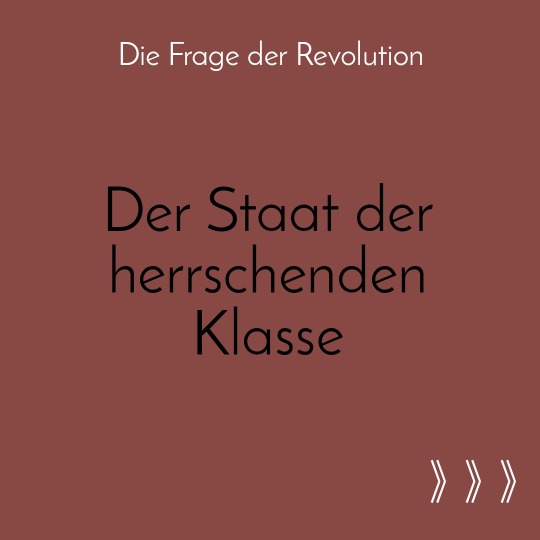
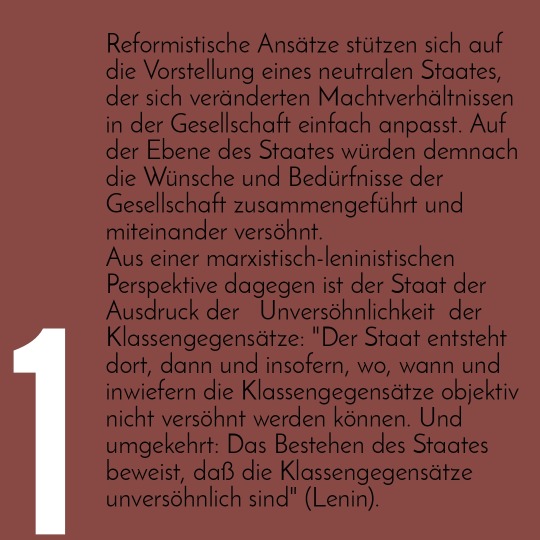


Nachdem wir auf den Reformismus eingegangen sind, stellen wir euch in diesem Post Einwände dagegen vor, deren These es ist, dass nur eine Revolution zu wirklicher Veränderung führen wird.
Weiterlesen:
Lenin: Staat und Revolution
Engels: "Anti-Dühring"
Engels: Der Ursprung der Familie, des Privateigentums und des Staates
Wohlstand für Alle (Podcast): Ep. 60: Staat und Markt sind keine Gegner!
Wohlstand für Alle (Podcast): Ep. 58: Karl Marx #5 - ist es vernünftig, höhere Löhne zu fordern?
#Reformismus#Revolution#Demokratie#Kapitalismus#Lenin#Engels#Marx#antifaschismus#antikapitalismus#anti-dühring#sozialstaat#flacher Staat#Lohnerhöhung#Gewerkschaften#Kommunismus#Sozialismus#Staat und Revolution#linke Theorie#Philosophie#Politik#Kritik#Widerstand
3 notes
·
View notes
Text
Bought myself a new copy of Anti-Dühring. It was published in 1942 and it's really in immaculate condition. I wonder if someone bought it and then never actually read it (mood)
32 notes
·
View notes